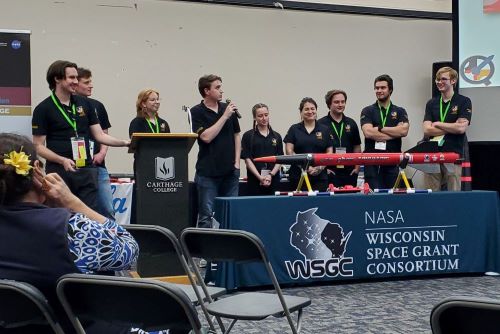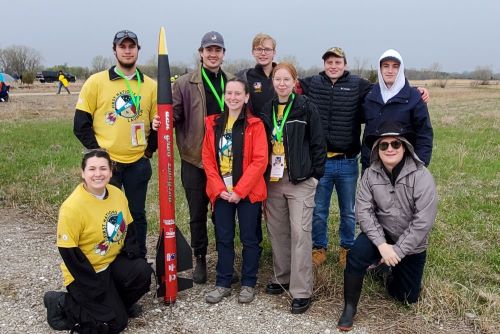The Queen’s Indigenous rocket team emerged victorious at the annual First Nations Launch competition this year, its fourth year of participation.
And for the first time ever, a Canada-based team ranked higher, based on points, than every other team at the competition.
The NASA-sponsored national rocket competition is an opportunity for Indigenous students to design, build, and fly a high-powered rocket at a competition of their peers. The Queen’s team made headlines back in 2021, when it became the first team not based in the United States to participate in First Nations Launch.
The Q-AISES team participated in the competition alongside teams from Tribal Colleges and Universities (TCU), Native American-Serving Nontribal Institutions (NASNTI), and similarly situated American Indian Science and Engineering Society (AISES) collegiate chapters at universities such as Massachusetts Institute of Technology, University of Hawai’i at Manoa, and University of California, Los Angeles.

Q-AISES Rocket Team completes their final oral presentation for the judges at First Nations Launch. Queen’s placed first in Oral Presentations as well as in Written Reports this year, in addition to being the overall champion.
Due to granting restrictions—NASA, the National Aeronautics and Space Administration, is an independent agency of the U.S. federal government and, by definition, cannot support Canada-based projects—the team from Queen’s has participated in a special International class for final rankings.
When the grand prize was awarded this year in the “Moon” and “Mars” challenge categories, victors University of Colorado-Boulder (88.8 total points) and University of Washington-Seattle (97.5 points) finished behind the International team at Queen’s, which was awarded 103.3 points after completing the Mars Engineering Challenge. The team had to fabricate their rocket from raw materials this year, making it lighter and stronger than an assigned commercial kit comparator.
“First Nations Launch is an excellent competition, from the way it is structured and managed, down to the unique opportunities and prizes awarded to the participants throughout the process,” says Melanie Howard, the Team Advisor. “The team has built up over several seasons, growing and sharing their skills in rocketry and responding to the various engineering challenges presented by the competition, so I’m particularly proud of their accomplishment this year in finishing first overall.”
According to a news release from the Wisconsin Space Grant Consortium, “The first-place teams, the University of Colorado-Boulder and the University of Washington-Seattle, along with our International Champion, Queen’s University, will be invited to Kennedy Space Center for a VIP tour in August.”
Madeleine Duncan from Curve Lake First Nation is one of the incoming Team Leads, and a third-year student in Geological Engineering.
“It’s an amazing feeling to have our achievement recognized in this way,” says Madeleine. “The team has worked very hard to get to this point and it will be a once in a lifetime experience to have access to Kennedy Space Centre. I’m very excited to see what this next year will bring with our 2024 rocket!”

Q-AISES team with this year’s rocket, “aen groo zwayzoo” (Mitchif, the language of the western Métis). The rocket was fabricated completely from scratch by the team.